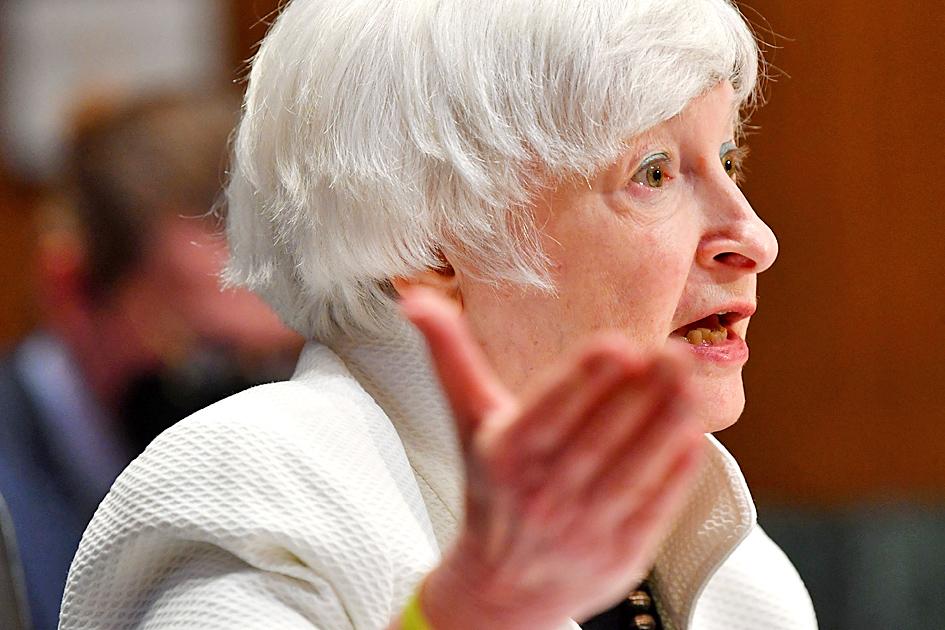“Unacceptably high” prices are likely to stick with consumers through the rest of the year and the US economy is likely to slow down, US Secretary of the Treasury Janet Yellen said on Sunday.
“We’ve had high inflation so far this year, and that locks in higher inflation for the rest of the year,” she said on American Broadcasting Co’s This Week.
“I expect the economy to slow,” she said, adding: “But I don’t think a recession is at all inevitable.”

Photo: AFP
US inflation last month accelerated to 8.6 percent, a fresh 40-year high that signals price pressures are becoming entrenched in the economy.
Those figures dashed any hope that inflation was starting to ebb, prompting the US Federal Reserve to unleash its biggest interest-rate increase since 1994.
The reasons behind stubborn inflation are “global, not local,” said Yellen, who pointed to disruption in energy supply from Russia’s invasion of Ukraine and goods coming in from China where COVID-19 lockdowns continue.
“These factors are unlikely to diminish immediately,” she said.
Federal Reserve Bank of Cleveland President Loretta Mester echoed Yellen’s view that growth will slow down, saying that threat of a US recession is increasing.
“The recession risks are going up partly because monetary policy could have pivoted a little bit earlier than it did,” she said on Sunday on CBS’ Face the Nation, referring to criticism that the Fed failed to raise rates at the first signs of runaway inflation late last year.
Mester sees it taking several years for the year-on-year headline inflation rate to return close to the Fed’s 2 percent goal.
Soaring prices are hurting Americans and an economic downturn by the start of 2024, barely even on the radar just a few months ago, is close to a three-in-four probability, the latest estimates by Bloomberg Economics showed.
US National Economic Council Director Brian Deese painted a rosier picture of the economy than Yellen and what Fed officials are saying. Deese referred to “independent forecasters” who “see inflation beginning to moderate over the course of this year.”
He also expressed hope that congressional passage of a bill that would lower the cost of prescription drugs, offer tax incentives for energy and other measures will take the pressure off of household finances.
Yellen said a gasoline tax holiday is “worth considering” if it could help consumers weather inflation.
“We have real strengths in this economy,” Deese said on CBS, citing high household savings and a jobless rate of 3.6 percent.
He said that the administration seeks to bring down inflation in a way “where we don’t have to give up all of those economic gains.”
Still, the US economy would likely fall into a mild recession by the end of the year, economists at Nomura Holdings Inc said.
“With rapidly slowing growth momentum and a Fed committed to restoring price stability, we believe a mild recession starting in the fourth quarter of 2022 is now more likely than not,” Nomura economists Aichi Amemiya and Robert Dent wrote in a note yesterday.
Excess savings and consumer balance sheets would help mitigate the speed of economic contraction, but monetary and fiscal policy would be constrained by high inflation, they said.
Nomura has lowered its real GDP forecast for this year to 1.8 percent, compared with 2.5 percent earlier, while the projection for next year is seen declining 1 percent, from 1.3 percent growth earlier.

Vincent Wei led fellow Singaporean farmers around an empty Malaysian plot, laying out plans for a greenhouse and rows of leafy vegetables. What he pitched was not just space for crops, but a lifeline for growers struggling to make ends meet in a city-state with high prices and little vacant land. The future agriculture hub is part of a joint special economic zone launched last year by the two neighbors, expected to cost US$123 million and produce 10,000 tonnes of fresh produce annually. It is attracting Singaporean farmers with promises of cheaper land, labor and energy just over the border.

US actor Matthew McConaughey has filed recordings of his image and voice with US patent authorities to protect them from unauthorized usage by artificial intelligence (AI) platforms, a representative said earlier this week. Several video clips and audio recordings were registered by the commercial arm of the Just Keep Livin’ Foundation, a non-profit created by the Oscar-winning actor and his wife, Camila, according to the US Patent and Trademark Office database. Many artists are increasingly concerned about the uncontrolled use of their image via generative AI since the rollout of ChatGPT and other AI-powered tools. Several US states have adopted

KEEPING UP: The acquisition of a cleanroom in Taiwan would enable Micron to increase production in a market where demand continues to outpace supply, a Micron official said Micron Technology Inc has signed a letter of intent to buy a fabrication site in Taiwan from Powerchip Semiconductor Manufacturing Corp (力積電) for US$1.8 billion to expand its production of memory chips. Micron would take control of the P5 site in Miaoli County’s Tongluo Township (銅鑼) and plans to ramp up DRAM production in phases after the transaction closes in the second quarter, the company said in a statement on Saturday. The acquisition includes an existing 12 inch fab cleanroom of 27,871m2 and would further position Micron to address growing global demand for memory solutions, the company said. Micron expects the transaction to

A proposed billionaires’ tax in California has ignited a political uproar in Silicon Valley, with tech titans threatening to leave the state while California Governor Gavin Newsom of the Democratic Party maneuvers to defeat a levy that he fears would lead to an exodus of wealth. A technology mecca, California has more billionaires than any other US state — a few hundred, by some estimates. About half its personal income tax revenue, a financial backbone in the nearly US$350 billion budget, comes from the top 1 percent of earners. A large healthcare union is attempting to place a proposal before